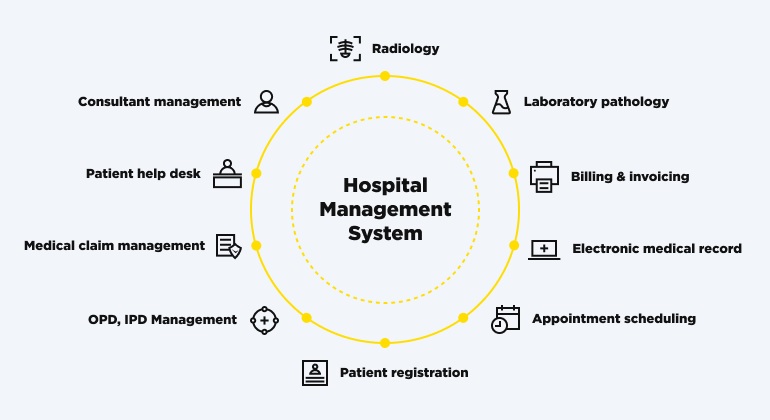Benefits and Uses of Hospital Management Software
What is Hospital Management Software
Hospital Management Software (HMS) is a computer program or system that manages the administrative and operational tasks of a hospital or healthcare facility. It includes modules for managing patient records, appointment scheduling, medical billing, inventory management, laboratory testing, and other functions that are essential to the efficient operation of a healthcare organization.
Hospital management software typically provides a centralized database that allows healthcare providers to access patient information in real time, from anywhere within the hospital or clinic. This helps to improve patient care and reduce errors, as well as streamline administrative processes.
HMS can be customized according to the needs of a particular hospital or healthcare organization, with features that include electronic medical records, medication management, patient billing, appointment scheduling, and more. It can also be integrated with other healthcare systems and devices, such as laboratory equipment and medical imaging systems, to provide a comprehensive solution for managing all aspects of patient care.
Benefits of Hospital Management Software
There are several benefits of hospital management software, including:
-
- Improved patient care
Hospital management software helps healthcare providers access patient information in real-time, enabling them to provide better, more personalized care to patients.
-
- Streamlined administrative processes
HMS automates many administrative tasks, including appointment scheduling, patient billing, and inventory management, freeing up time for healthcare providers to focus on patient care.
-
- Increased efficiency
By automating processes and providing real-time data access, HMS helps hospitals and clinics operate more efficiently and with fewer errors.
-
- Enhanced data security
Hospital management software provides a centralized database for patient records, improving data security and reducing the risk of data breaches.
-
- Cost savings
By reducing manual labor, automating processes, and improving efficiency, HMS can help hospitals and clinics save money in the long run.
-
- Improved communication
Hospital management software facilitates communication between healthcare providers and patients, as well as among healthcare providers themselves.
-
- Better resource utilization
HMS can help hospitals and clinics better manage their resources, including staff, equipment, and inventory, leading to better utilization and less waste.
Overall, hospital management software helps healthcare organizations operate more efficiently, provide better patient care, and reduce costs, ultimately leading to better outcomes for patients and the healthcare system as a whole.
Advantages of software for hospital management
The advantages of using software for hospital management include:
-
- Automation of administrative tasks
Hospital management software automates tasks such as appointment scheduling, patient billing, and inventory management, reducing the workload on hospital staff and freeing up time for patient care.
-
- Improved accuracy and efficiency
With software, data can be entered quickly and accurately, reducing the risk of errors and improving efficiency.
-
- Centralized data management
Hospital management software provides a centralized database for patient records, making it easy for healthcare providers to access patient information from anywhere in the hospital or clinic.
-
- Better patient care
Hospital management software improves patient care by providing healthcare providers with real-time access to patient information, allowing them to provide better, more personalized care.
-
- Enhanced communication
Hospital management software facilitates communication between healthcare providers and patients, as well as among healthcare providers themselves.
-
- Cost savings
Hospital management software can help hospitals and clinics save money in the long run by reducing manual labor, automating processes, and improving efficiency.
-
- Improved resource utilization
Hospital management software can help hospitals and clinics better manage their resources, including staff, equipment, and inventory, leading to better utilization and less waste.
Overall, hospital management software can improve the quality of patient care, reduce costs, and enhance the efficiency of hospital operations, making it an essential tool for modern healthcare organizations.
Disadvantages of software for hospital management
While there are many advantages of using software for hospital management, there are also some potential disadvantages to consider, including:
-
- Initial implementation costs
The upfront costs of implementing hospital management software can be significant, including the cost of purchasing software licenses, hardware, and training staff.
-
- Learning curve
Hospital management software can be complex, and it may take some time for staff to learn how to use it effectively. This can lead to a temporary decrease in productivity and efficiency during the transition period.
-
- Technical issues
Like any software, hospital management software is subject to technical issues such as system crashes, bugs, and other glitches that can cause downtime and disrupt operations.
-
- Security concerns
Hospital management software stores sensitive patient data, and there is always a risk of data breaches and cyberattacks that could compromise patient privacy.
-
- Dependence on technology
Hospital management software relies on technology, which can be vulnerable to power outages, internet connectivity issues, and other disruptions that can disrupt operations.
-
- Need for regular updates
Hospital management software requires regular updates and maintenance to ensure that it is functioning properly and to address any security vulnerabilities.
Overall, while the advantages of hospital management software can outweigh the disadvantages, healthcare organizations should carefully consider these potential drawbacks and take steps to mitigate the risks. This includes investing in high-quality software, training staff effectively, and implementing robust security protocols to protect patient data.
What is the use of software for hospitals?
The use of software for hospitals is to streamline and automate administrative and clinical processes, manage patient records, and improve patient care. Hospital management software helps healthcare providers manage tasks such as patient registration, appointment scheduling, medical billing, and inventory management. It also provides a centralized database for storing patient records and allows healthcare providers to access patient information in real time from anywhere in the hospital or clinic.
Some specific uses of software for hospitals include:
-
- Electronic medical records
Hospital management software enables the creation, storage, and retrieval of electronic medical records, making it easy for healthcare providers to access patient information quickly and accurately.
-
- Appointment scheduling
Hospital management software allows patients to book appointments online or over the phone and provides healthcare providers with a centralized calendar for managing appointments.
-
- Medical billing and claims processing
Hospital management software automates the medical billing and claims processing process, reducing errors and improving efficiency.
-
- Inventory management
Hospital management software helps hospitals and clinics manage their inventory of medical supplies, reducing waste and ensuring that they have the necessary supplies on hand when needed.
-
- Clinical decision support
Hospital management software can provide clinical decision support tools that help healthcare providers make more informed decisions about patient care.
Overall, hospital management software helps healthcare organizations operate more efficiently, reduce costs, and provide better patient care.
Which software is used in hospitals?
There are many different types of software used in hospitals, each with its own specific purpose. Here are some examples:
-
- Electronic Health Record (EHR) Software
EHR software is used to store patient health information, including medical history, diagnoses, test results, and treatment plans.
-
- Practice Management Software
Practice management software helps healthcare providers manage administrative tasks such as scheduling appointments, billing, and managing patient records.
-
- Picture Archiving and Communication System (PACS)
PACS is used to store and manage medical imaging data such as X-rays, CT scans, and MRIs.
-
- Hospital Information System (HIS)
HIS is a comprehensive software system that integrates multiple applications to manage various aspects of hospital operations, including patient care, financial management, and administrative tasks.
-
- Pharmacy Management Software
Pharmacy management software is used to manage medication dispensing and inventory management in hospitals and clinics.
-
- Medical Billing Software
Medical billing software is used to manage medical billing and claims processing, including coding, billing, and reimbursement.
-
- Telemedicine Software
Telemedicine software is used to facilitate remote medical consultations and telehealth services, allowing patients to receive medical care from a distance.
Overall, hospitals and healthcare organizations use a variety of software applications to manage their operations and provide better patient care. The specific software used can vary depending on the needs and priorities of the organization.
Conclusion on software for hospital
In conclusion, software for hospital management is a critical tool for modern healthcare organizations. It streamlines administrative and clinical processes, improves patient care, and helps healthcare providers manage patient records more efficiently. Hospital management software comes in many different types, including Electronic Health Record (EHR) Software, Practice Management Software, Picture Archiving and Communication System (PACS), Hospital Information System (HIS), Pharmacy Management Software, Medical Billing Software, and Telemedicine Software.
While there are some potential disadvantages to using hospital management software, such as implementation costs, a learning curve, and security concerns, the benefits of using software for hospitals can outweigh these drawbacks. By investing in high-quality software, training staff effectively, and implementing robust security protocols, healthcare organizations can leverage software to improve efficiency, reduce costs, and provide better patient care.
Which software is used for the hospital management system?
MocDoc Hospital Management Software is the best solution which is completely integrated for any type of hospital from small to multichain hospitals. The Hospital Management Software for OP includes Doctor Discovery, Check-In, Mobile apps, Prescription, Appointments, Billing, and more.
What Is the Purpose of the Hospital Management Software?
A hospital management software program can help a hospital administrator, human resource manager, inventory handler, and so on in a lot of ways. It makes it easy for someone to take a glance at the data and find the right information in an instant.
It streamlines all the hospital needs, namely management-related, administrative, logistical, clinical, medicinal, and almost everything a hospital handles and takes care of. Furthermore, it helps a hospital with a lot of good outcomes like cost-effectiveness in each of its processes, collaborative working of the staff members, timely providing help to the patients, and improving the hospital’s overall customer service rate.
What Is the Estimated Time Frame to Take to Implement the Hospital Management Software Solution?
Implementing the hospital management system is a straightforward process. All it needs is to install the software, which may vary from a few minutes to an hour or so. In case you need a demo, the vendor representatives can check the system requirement and match it with your hospital’s IT infrastructure.
What are the best hospital management systems?
Some popular hospital management systems include:
All scripts Sunrise
Hospital ERP Software
Caspio
10to8
Definitive Healthcare
Apigee Healthcare APIx
Symplr Access
What is a hospital management information system?
A hospital management information system is a computerized system that helps in managing clinical, financial, laboratory, Inpatient, outpatient, pharmaceutical, etc. operations in a hospital. With the help of the Hospital Management Information system, healthcare providers can focus more on providing quality healthcare to patients.
What is the use of hospital management software?
The hospital management system helps register complete patient information. It captures and stores the medical history, treatment required, details of their previous visits, upcoming appointments if any, reports, insurance details, and more. It helps eliminate the need to get these details on every visit.
Is a hospital management system software?
An HMS is a web-based or computer-based software system that helps to control different complex workflows and processes which are inherent to the normal working of any hospital.
Which is the best hospital IT management system software?
Hospital Systems is a customizable, comprehensive, and integrated Hospital Management System designed to manage hospital operations. The ideal client base for hospitals is Healthcare facilities, multi-specialty clinics, and medical practitioners. Multi-Location functionality allows…
What is hospital management software used for?
Hospital management software is a software tool that automates the management of various day-to-day operations of a hospital. It helps oversee the administrative as well as financial aspects of running a healthcare facility.
Why do hospitals need software?
It helps to make the process faster and error-free. The Hospital Information system software enables the staff to enter insurance discounts, service prices, and other additional charges. It is now matched with the particular treatment or service made to the patient.
Contact us for More Services, Which we Provide
7) Chat Service
Contact Us
+91-9380797662
info@emazel.com
Author


